I’m practically a “newcomer” myself, having started this journey in late 2019… and then the world ground to a halt. I went to a few in-person events before the plague, a few after it, and a lot of online “events” in between.
A few weeks ago, I sat down with some friends and we were talking about our experience as SCA newcomers — surprising things we learned, things we wish we’d known before we started. And the idea for this article was born!
So, from nearly-a-newcomer to all of you who are considering the SCA for the first time, here are seven big things I didn’t know when I started.
1. The SCA, “where your hobby has hobbies”!
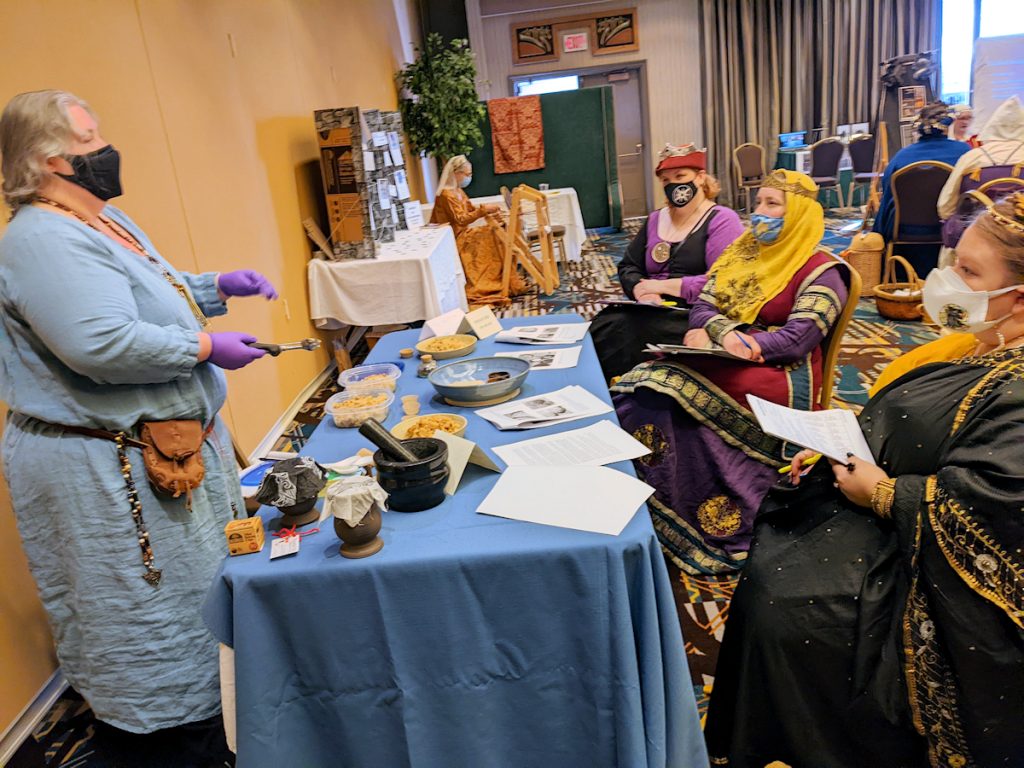
I think this is the biggest one! I had no idea, when I started, that there are people in the SCA that do… just about anything. If some medieval person made things, or studied things, or sang or wrote poetry about it, or fought with a type of weapon, there’s a group of people in the SCA who are really into it. There are people who geek out about a specific culture at a specific time. People who build siege weapons. Painters and singers and axe-throwers and everything else!
If you already make or do or learn things in your everyday life, you can probably bring that hobby with you to the SCA and immediately have something to talk about. You will soon meet people who find it as fascinating as you do. I have a vegetable garden — there’s a medieval gardening group. I make meads and wines — there’s a brewer’s guild. I like to sew things — there are clothing groups. It’s a little crazy, to be honest.
2. You can learn all the things. ALL OF THEM.
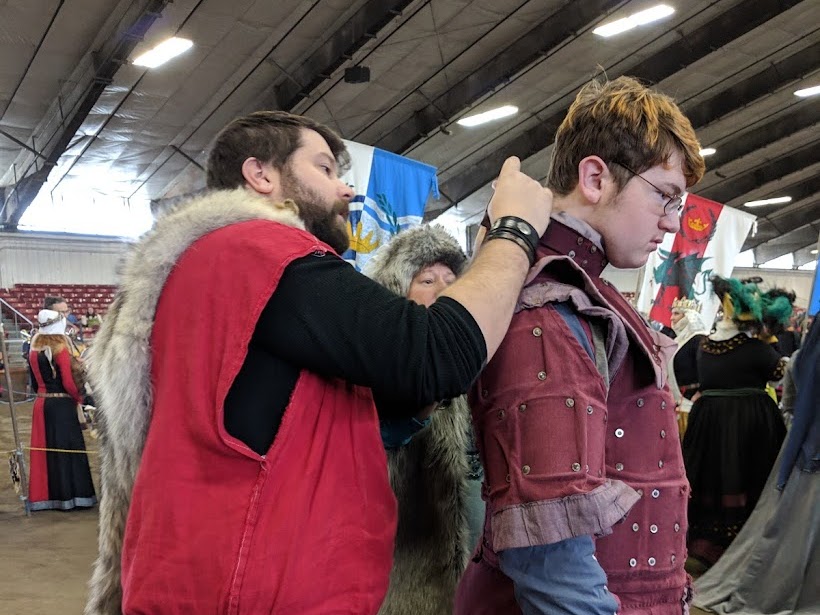
That awesome sword fight you just saw? Yeah, that can be you — with time and practice. But you’ll never have a shortage of people who will help you learn!
I’m amazed by the number of people in the SCA who will teach you how to do… whatever… they’re doing. They’ll tell you what XYZ is, how it’s done, when and where you can find a class about it, point you to websites or a Facebook group, and maybe even have some extra stuff on hand to let you try a little bit here and how. It’s an easy way to meet new people — just ask about their thing. Often, it’s harder to get someone to STOP talking about their passion than to get them started!
I especially like the beginner “Doing the Thing 101” classes. Try a little of this and a little of that. Maybe I won’t fall in love with it, maybe I will, but I always feel I learned a little and can better appreciate the art and skill of the people who really are into it.
3. Everybody can find somewhere they fit in.
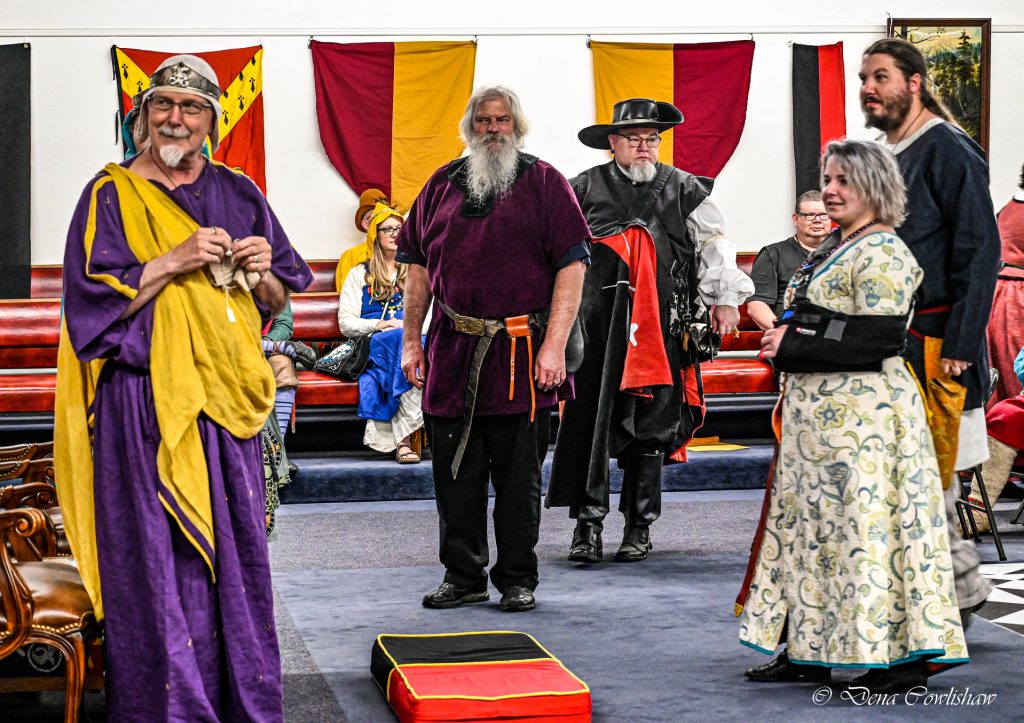
I just came home from my first weekend-long SCA event. There was literally something for everybody — tournaments for new fighters and for experienced ones, hands-on crafting classes, demonstrations of historical cooking and archery, daytime activities for kids, a nighttime tavern for adults. Court, with all the pomp and HUZZAH! and people getting awards and bards performing. Some people had modern camping tents, there were a few canvas historical pavilions, another area for RVs, and some people stayed in hotels or just came for a day.
And, that hobby that has hobbies? Each one is an opportunity to meet other people doing the same thing. It can be hard for me to meet new people, because big groups — I just don’t know where to start?! But really, the SCA is a collection of many overlapping small groups focused on different parts of the larger hobby. You won’t fit in with every one of them, but you will find SOME that fit you “just right”.
Finally, I learned it’s okay to join a group in a different place than the one where you live. Sure, the SCA has divided the world up into baronies and shires and all that according to zip codes — but those are guidelines, not rules. I’ve met a few people who live in one Barony’s zip code but belong to another, because the type of fighting or craft they love is stronger there.
4. You don’t have to pick a persona (time and place) right away.
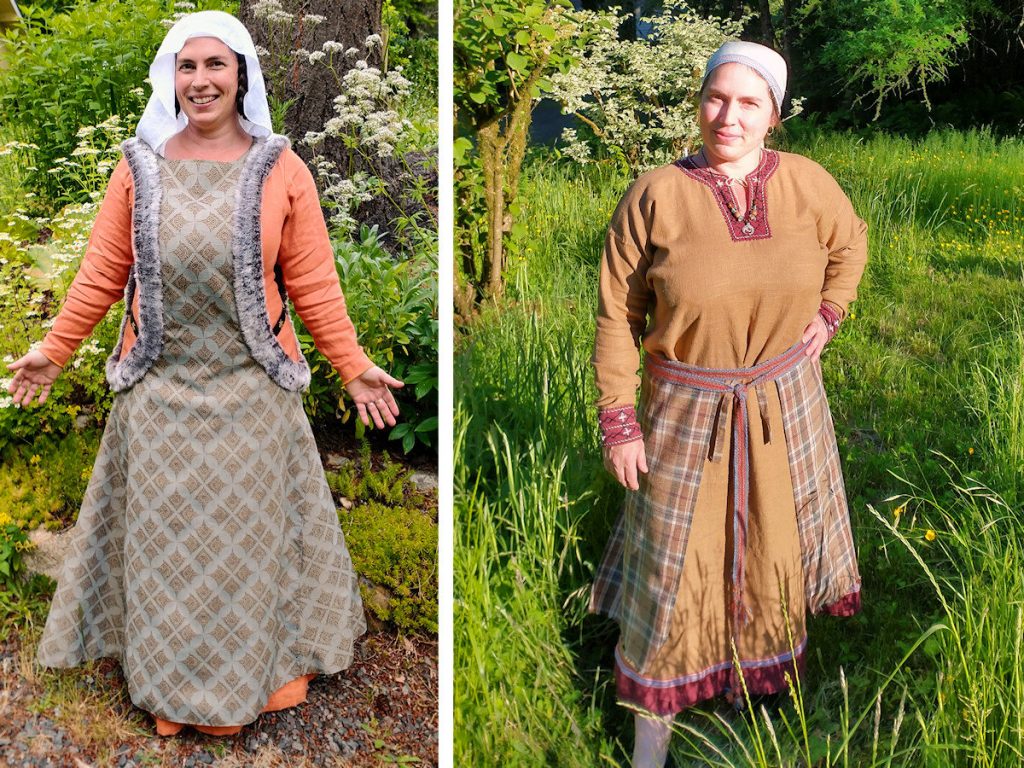
It’s great to pick a time and place for your “persona” — your SCA identity — and view and study the ancient or medieval world through that lens. But you don’t have to do it right away, and you can even have more than one. You can pick a historical name right away (there are lists of names at the SCA College of Arms) or you can just go by “Your-modern-name of Your-local-group” (fill in the blanks).
Some people already know that they want to be from a place, maybe because their ancestors came from there. Some people are really into a time period or an empire or a type of fighting that was common in a certain time and place. Me, I wanted to make and wear the clothing of the 14th century. But I have a friend who still hasn’t exactly picked a place and time, and he’s been participating for years. No problem!
5. The SCA has activities that don’t require any special clothing or equipment.
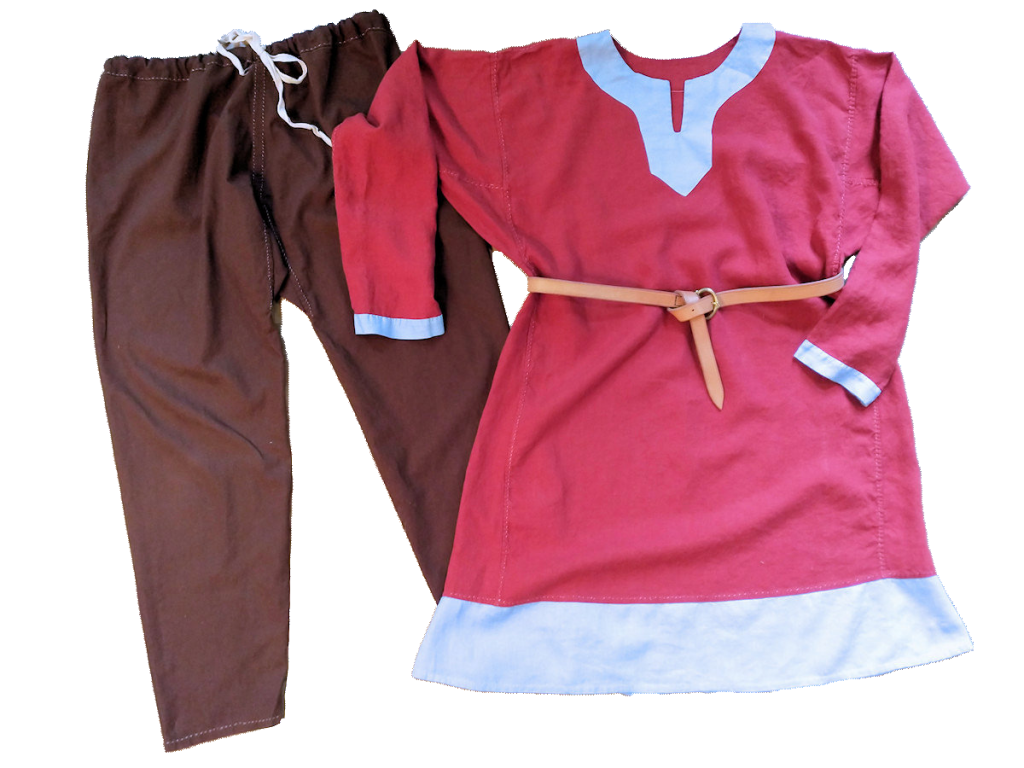
This was a surprise to me, but a lot of the weekly gatherings or small classes are “come as you are.” In Dragon’s Laire, that’s every Tuesday evening — just, you know, drop in after work or classes and say hello!
Only big events encourage us to make an attempt at historical clothing… that’s “garb” in SCA lingo. For that, we have “Gold Key,” where the Chatelaine’s office has extra clothing that people can borrow for an event. And “starter garb” can be as simple as a tunic-belt-pants, or a long gown with a belt. Tuck your cell phone into a fabric pouch, or a basket with a cloth thrown on top, and you’re set.
Fighters typically bring their own weapons and protective gear, but there’s also some extra gear for people to borrow and try the different styles of combat. It’s best to reach out to that combat Marshal in advance, so the person in charge of “loaner gear” knows to load extra stuff into their car. (Or you can always ask the Chatelaine to help connect you to the right person.)
And if you go to an event with food, you usually bring “feast gear” (a plate, a bowl, a cup, and some silverware), but again — there’s probably someone there with extra, in case you forgot yours. It might be chopsticks and a bowl, and the dessert might be ice cream, but someone will try to help you out!
6. Getting started can be as inexpensive — or as fancy — as you want.
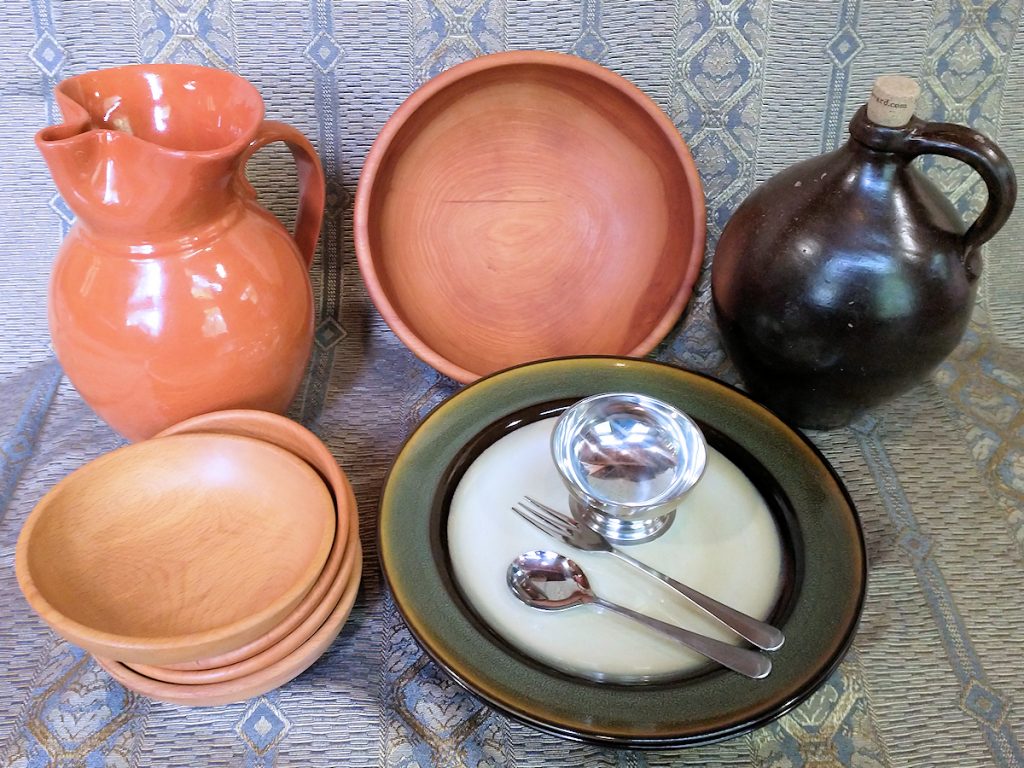
I love thrift stores. I love tiny little hole-in-the-wall antique stores on back highways. For me, finding that bargain plate or bowl that looks medieval(ish), or finding a linen curtain that I can turn into a smock, is half the fun.
Sure, not everybody is me. There are a lot of places to buy things ready-made — merchants at events who specialize in making historically-inspired things, SCA-specific local swap meets, online marketplace groups, etc. So many merchants struggled with the loss of in-person sales during COVID, our kingdom added a web page to help us find them online: the Virtual Marketplace (link opens in new tab).
And there’s an extensive DIY tradition within the SCA. Learn how to make it yourself, or trade something you made with someone who makes what you need. Whatever it is you need, there’s probably a website or YouTube tutorial out there. There might be a local or online SCA class about it. You might live just a few miles from someone who’s really skilled and willing to teach you.
Especially if you’re just getting started, remember that anything that looks medieval(ish) and gets the job done can work. You can always change it up later, and when that time comes, some even-newer-newcomer would probably love to have it.
7. You don’t need an official SCA membership to play — but you get discounts!
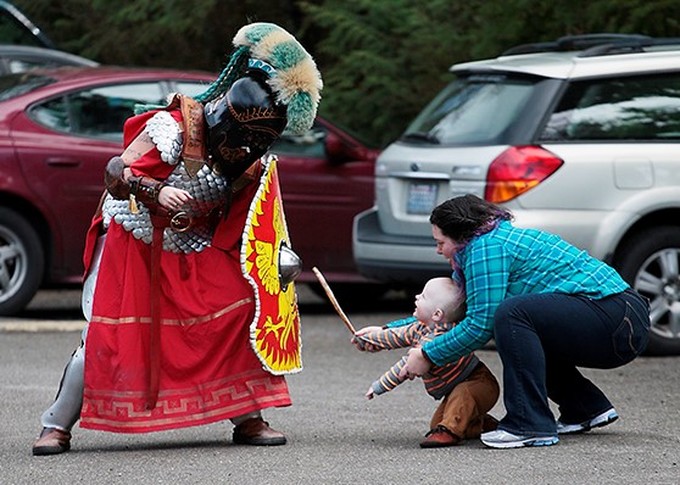
The SCA isn’t like the other global gaming/LARP organizations I’ve been in — paying for an official membership is OPTIONAL for almost everybody. You only have to have a “blue card” to be an Officer or Champion, because those people are official and such. The rest of us can just show up!
Most of the time, every adult with an official membership gets $5 off at an event with admission fees. In Dragon’s Laire, youth entry is free — but in other places where kids pay admission, they get a discount too. Those discounts can quickly add up to the cost of membership! Membership just isn’t that expensive, especially if you’re eligible for discounted family membership rates (adults and/or kids with the same address). There are some other bonuses to membership, of course — but discounted admission was the big “selling point” for me.
The bottom line:
Like so many things in life, the SCA is what you make of it — what you bring and what you take away. But I found a lot of room for all sorts of crazy hobbies and rabbit-holes of research and weird and wonderful people.
I hope that you find your happy place!

by Caterina da Savona
with special thanks to my co-conspirators — Máenach na Cailled, Hugues de Bertoncourt, and Ciar ingen Fiachnae
